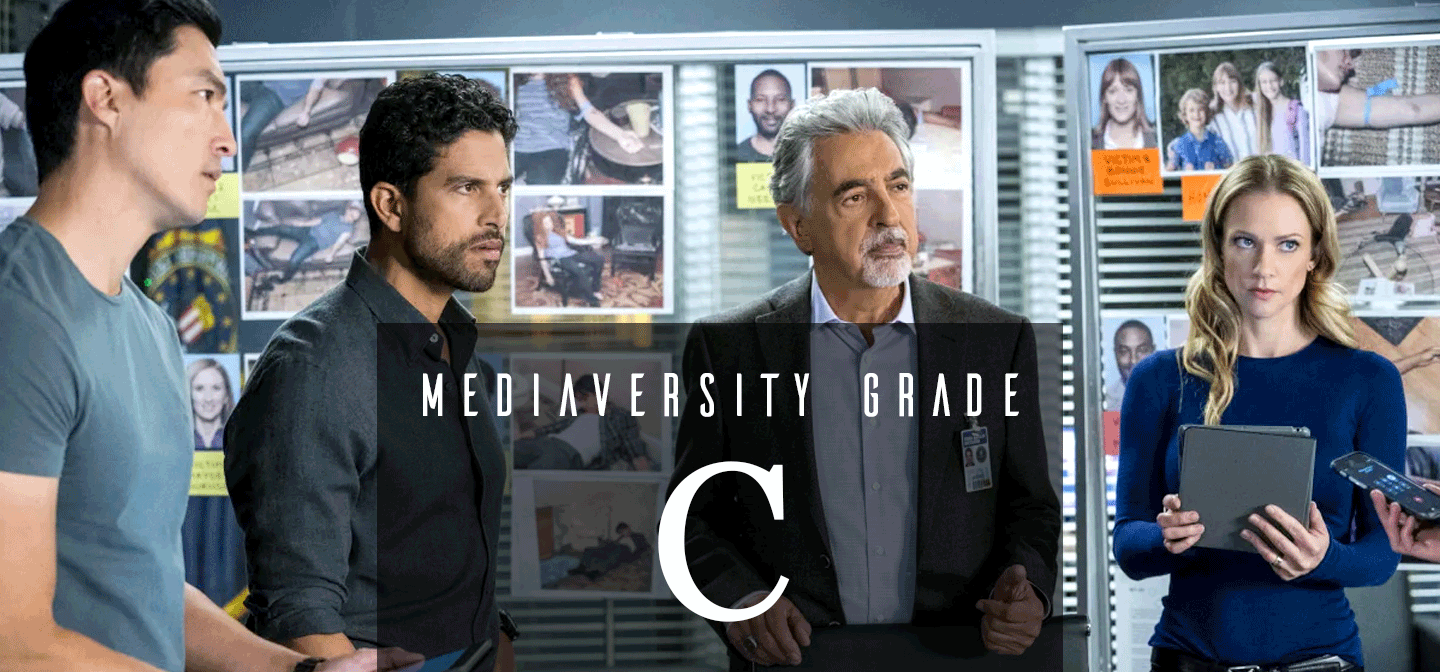Criminal Minds - Season 15
“Bled dry, Criminal Minds slipped away from its television bonds, off to the big TiVo in the sky.”
Title: Criminal Minds
Episodes Reviewed: Season 15
Creator: Jeff Davis 👨🏼🇺🇸
Writers: Christopher Barbour 👨🏼🇺🇸 (2 eps), Bruce Zimmerman 👨🏼🇺🇸 (2 eps), Breen Frazier 👨🏼🇺🇸 (2 eps), and various
Reviewed by Dana 👩🏼🇺🇸♿
Read Season 14 review here.
Read Season 13 review here.
Technical: 3.5/5
Endings are hard. Television endings might be even harder.
How do you close out a story that’s run a course through years, served as a predictable counterweight to the unpredictability of real life, and built relationships between fans and meticulously constructed characters? A bad finale can permanently mar a show’s legacy—just ask the writers for How I Met Your Mother, whose finale went down as one of the most universally despised. Surprise twists and unsatisfying conclusions, from St. Elsewhere to The Sopranos, can split viewer opinion between those who herald a conclusion as pure genius or a travesty, refusing to let the debate settle for decades. It’s rare to pull off a real win, as The Good Place did earlier this year, and harder still when the show has been in a slow decline for years.
Criminal Minds’ finale will not go down as either genius or travesty. Like so much of the series, its defining feature is predictability: A bad guy must be stopped, agents are in peril, and nobody mentions how much paperwork will be required to explain their definitely-not-standard-procedure actions. The final episode’s most ambitious act was trying to bring together some of its more memorable secondary characters in an expository dream sequence, not all of which made sense. It served more as a reminder of who wasn’t there at the end: Thomas Gibson’s Agent Hotchner, absent because the actor was fired for assaulting a writer; Mandy Patinkin’s Agent Gideon, killed off seven years after the actor walked out in frustration with the graphic violence central to the show; and Shemar Moore’s Agent Morgan, who was busy starring in SWAT where he plays more or less the same character he did on Criminal Minds.
I don’t mean to rag on the finale; I didn’t hate it, though I did hold out hope until the very last moment that, after fifteen years, somebody would unfurl a banner that read “I’m gay!” in giant, rainbow letters and make the show’s record on queer representation just a little less dismal. Jayne Atkinson’s return as Erin Strauss felt like a tacit admission that the character deserved better than being killed off in Season 8, though I admit that I’m reading into it what I want. Mostly, it just capped a shortened season that demonstrated how little was left for Criminal Minds to say or do.
Criminal Minds has never been a show that sought to speak to the moment, nor one that was willing to evolve. Even though the concept of profiling seemed novel a decade and a half ago, it offers little to a modern audience. Bled dry, it slipped away from its television bonds, off to the big TiVo in the sky.
Gender: 3.75/5
Does it pass the Bechdel Test? YES—in 7 out of 10 episodes
It says something that through fifteen seasons, the closest the show ever came to challenging the status quo—of either the universe or the FBI—was a brief shot of a mug that bore the word “feminist.”
A New York Times op-ed by actor Brit Marling perfectly captures the problematic way that Criminal Minds frames empowerment. The archetypal Strong Female Lead, Marling writes, is “an assassin, a spy, a soldier, a superhero, a C.E.O. [...] She’s got MacGyver’s resourcefulness but looks better in a tank top.” She caters to the desire for “a man but in the body of a woman I still want to see naked.”
I am loath to describe the women of Criminal Minds in such reductive language, because they are talented actors who take pride in their roles representing women in law enforcement. They are conscious of the value of representation—I’ve chatted with two of them about the Bechdel Test. And showing that women can do all of what men can, especially in a male-dominated field, isn’t nothing. But as Marling recounts, “the more I acted the Strong Female Lead, the more I became aware of the narrow specificity of the characters’ strengths—physical prowess, linear ambition, focused rationality. Masculine modalities of power.” The entire premise of Criminal Minds rests on systems of oppression designed by men, usually white men, in which the virtues of power and violence depend on who’s wielding them.
In a brief moment of social awareness, Criminal Minds acknowledges that the Bureau has never had a female director, before breaking with reality to offer Agent Prentiss (Paget Brewster) the role. It’s framed as a feminist triumph, but executed with the show’s signature colorblind perspective: As the Black deputy director sits across from Prentiss, there’s no equivalent acknowledgement that FBI directors have always been white—as have deputy directors, and even associate deputy directors. In fact, no woman (or person of color) has ever risen beyond the fourth-highest rank, Executive Assistant Director.
In context, it feels dishonest, glossing over the Bureau’s abysmal track record and reflecting the larger superficiality of the show’s diversity, more notable for what it omits than for what it includes. The added twist—in the finale, Prentiss’ chances at becoming director are dashed when she takes responsibility for a call that got six agents killed—adds another layer of disingenuousness to the mini-arc. It seems, in hindsight, like little more than a bit of melodrama with scripted words that mimic progress—“given the chance to make history, I’m going to take it”—without any real intent.
After analyzing fifteen seasons’ worth of data on the Bechdel Test, Mako Mori Test, and an array of other factors, I found that it didn’t matter what the gender of an episode’s writer or director was—there was no no impact on how female-centric the end result would be. Women were just as prone as men to write characters of either gender into life-threatening danger. It’s worth noting, though, that the culture of a writers’ room, and how its members write women, is often set early on. In the case of Criminal Minds, it wasn’t until the seventh season that at least half of the episodes were being written by women. Even in its last season, only 40% of episodes were written or co-written by women—again reminding us how resistant Criminal Minds was, until the end, to change.
Race: 3.75/5
Not much in how Criminal Minds deals with race has changed since our review of Season 14. The cast still looks much more representative of the U.S. population than it did when the show premiered in 2005, though the bar was incredibly low. The cast has remained static since Agent Walker (Damon Gupta) was swapped out for Agent Simmons (Daniel Henney) at the start of Season 13, at which point three of the eight main cast members were people of color. Criminal Minds remained a staunchly colorblind show until the end, only explicitly acknowledging race and racism on a handful of occasions, most recently in Season 12’s “Mirror Image,” when Agent Tara Lewis (Aisha Tyler) references Gone with the Wind, which “most Black folks aren’t crazy about.” She made a point growing up, she explains, of clarifying the pronunciation of her name as distinct from the name of the plantation in the movie.
The series’ most purposeful attempt to confront racism came in Season 9’s “Strange Fruit,” written by Janine Sherman Barrois (now the showrunner for Claws). The title itself is evocative: ”Strange Fruit” is the title of Billie Holiday’s haunting song protesting the lynching of Black people, which she performed before both Black and white audiences despite violent heckling from the latter and extreme harassment by the FBI. In addition to the episode’s usual fare of gruesome murder and a whodunit, Barrois’s script delves into the lasting trauma of racism and violence, constructs of Black masculinity, and the particular stigma against mental illness in the Black community. Agent Morgan (Shemar Moore), still the only person of color on the team at that point, gets the opportunity to exist not only as an agent, but specifically, as a Black agent. This expansion of the character’s identity opens up the door to different interactions both between Morgan and the suspects and within the team itself. It’s a richer well of material from which to draw, and the episode earned the second-highest ratings of the season. It also serves to clarify that the show’s failure to address race in a meaningful way is entirely a matter of will, not ability.
LGBTQ: 1/5
Criminal Minds’ final season places an emphasis on heteronormativity, sending a clear message about what happy endings look like. The previous season saw Agent Rossi (Joe Mantegna) tie the knot with an ex-wife, JJ (AJ Cook) declare her love for Reid (Matthew Gray Gubler), Prentiss find love in the midst of a killing spree, Alvez (Adam Rodriguez) move in with his girlfriend, and Simmons learn that his wife was pregnant. It seemed like a high bar for how aggressively straight a show could get, but I’ve learned to never underestimate a CBS series’ capacity to trumpet outdated ideals.
A time jump six months into the future brings us to Reid and JJ dealing with her grand announcement so neatly that it begs the question as to why it was ever brought up to begin with, while the various and sundry heterosexual pairings do whatever heterosexual couples do to keep the flame alive (I assume play Boggle and watch House Hunters). Reid gets a girlfriend who finds his idiosyncrasies charming, because she has a nephew with the same tendency for spouting facts and disregarding social mores, and it’s not at all creepy to date a guy who reminds you of your nephew. Simmons’ wife gives birth as women on TV do—going into labor in the space of a second—while Prentiss’ one date with a fellow agent turns into a committed long-term relationship complete with flower deliveries and an effervescent tween who thinks her dad’s new girlfriend is a hottie.
Navigating the majority of the characters into traditional, heterosexual relationships makes clear how much the show equates happiness with a very narrow definition of romance. Despite the occasional queerbaiting tweet, Criminal Minds has never had an interest in making space for queer characters, let alone queer happiness. With no queer protagonists, it feels especially problematic to see one-off queer characters in mysteries of the week relegated to the status of either victim or violator.
The first few episodes of the final season established a troubling pattern of equating queerness with deviance: The double-header premiere sees a suspect exploiting a same-sex romance to sustain a killing spree, then disposes of her lover with little fanfare. The season’s fourth episode features a stalking mystery that leads to the revelation of a jealous, closeted perpetrator terrorizing the girlfriend of the man he loves. While it provides a twist to the story, the reveal misses the opportunity to focus on the unique threats that lesbian, gay, trans, bisexual, and other queer individuals face with respect to domestic abuse, instead subtly linking the perpetrator’s homosexuality to his violent behavior.
In those last moments of the finale in which I’d hoped someone would come out in grand fashion, possibly employing a marching band led by RuPaul and several glitter cannons, viewers were treated to a different break from longstanding tradition. Newly single, because his girlfriend justifiably had some issues with almost being fridged by a vengeful baddie, Alvez asks Penelope Garcia (Kirsten Vangsness) to dinner. Through fifteen seasons, there has always been a rule that main characters didn’t get together, and it’s meaningful that only as Garcia leaves the Bureau does a coworker make romantic overtures. Much as it’s laudable that the boundaries between personal and professional remain firmly intact, it’s one last win for heteronormativity, and one last bucket of cold water dumped on the decks of queer ships.
Mediaversity Grade: C 3.00/5
Criminal Minds was found slain in its usual time slot, after weeks of inconsistent airings and back-to-back episodes reminiscent of a network burn-off. Despite its declining ratings, Criminal Minds served as a mainstay in CBS’ lineup of procedurals whose diluted brand of empowerment and diversity were palatable to both red-state and blue-state viewers.
Initial efforts to turn the series into a franchise in the vein of CSI and NCIS, whose geographic spinoffs found wild success, were tragically short-lived; both Criminal Minds: Suspect Behavior and Criminal Minds: Beyond Borders failed to recreate the success of the original. Ultimately, Criminal Minds served as a model for a new era of procedurals on the network. Updated to reflect a demand for representative casting, successors like SWAT, FBI, and SEALS followed the model of an ensemble cast whose diversity ticks boxes but says little to nothing about identity or oppression. The formula, lauding law enforcement as heroic figures acting in good faith to save innocents from bad actors, provides an idyllic sense of comfort in a world of uncomfortably hazy models of right and wrong and a deeply problematic justice system.
Unfortunately, that unwillingness to push boundaries that characterized the show throughout its run veered closer and closer to willful ignorance, or even complicity, in its final years. Criminal Minds is ultimately survived by reality, in addition to endless reruns that seem less and less relevant as time goes on.




